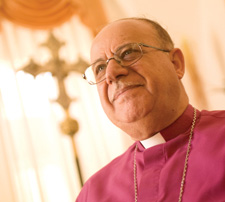CROSS CURRENT
with MARGARET RODGERS
The Ugandan-born Archbishop of York, who has a fine eye for the use of symbols, gained much media attention when he shaved his head and spent seven days in a tent in York Minster. He aimed to show solidarity with those caught up in the Middle East conflict.
When he ended his seven-day fast, Archbishop Sentamu said that every country had to create an inclusive society that did not breed rejection or extremism.
"We must each and every one of us hold responsibility for seeking peace in our own time, in our own streets and in our own homes as well as continuing to pray for the world," he said. "The dividends of peace are incalculably greater than the wages of conflict" "
The Archbishop of Canterbury Dr Rowan Williams, a man of formidable intellect, penned an article that was published with the heading "The voices of the innocent must be heard above the din of war'. He called for a law-governed situation to emerge that would guarantee a shared future for the ordinary people, [whether] Israeli, Palestinian or Lebanese.
The two Archbishops, like the Pope, are worldwide figures whose words are usually heeded. But that is not always the case when other church leaders speak.
A plethora of statements was issued by church leaders on the Middle East. It must be asked how much attention was paid to these pronouncements, either by the protagonists in the conflict, by the international diplomatic community focused in the UN, or here in Australia by our own Federal Government.

Of course local church leaders in any conflict have a lot to say to the world. Bishop Riah Abu El-Assal, the Anglican Bishop in Jerusalem, issued a long letter on the recent crisis. An Anglican of Palestinian background, his sympathies are plainly obvious, albeit his is a grassroots voice. Bishop Riah commenced: "For the past 40 years we have been largely alone in the desert fighting a predator that not only has robbed us of all but a small piece of our historic homeland, but threatens the traditions and holy sites of Christianity". He finished, "Perhaps as others…you will ask, "What can I do?' Certainly we encourage and appreciate your prayers. That is important but it is not enough. If you find you can no longer look away, take up your cross. Write to every elected official you know. Write to your news media. Speak to your friends, and colleagues about injustice and the threat of global war."
His was a stirring call to action, to prayer and political action. But can any lobbying we do here affect an overseas situation? Often politicians do note grassroots opinions carefully, though to change policy and strategy the views have to be persuasive.
It is questionable if much was achieved by the Canberra church leaders statement on the Middle East. Their media release twice said, "We are outraged…"! That may make them feel better in themselves, but sending out a media release about your own feelings " however graphic a description of violence, pain and suffering you offer, as they did " is hardly likely to persuade many to your point of view.
In addition the Canberra church leaders included, "We find it impossible to understand how the leaders of our own nation have remained so cowardly silent in the face of such brutality'. That too is strong opinion, but almost certainly guaranteed to make its way speedily into our national leaders' wastepaper baskets.
Political action is often necessary, though I myself find it hard to understand how statements expressed here in Australia can have much effect on the actions of Hezbollah, Israel, the United States, Iran and Syria, or the UN in regard to the Middle Eastern conflict.
And I do question Bishop Riah's implied suggestion that prayer is helpful but not enough. I am persuaded that "the eyes of the Lord are upon the righteous, and his ears are open to their prayer. But the face of the Lord is against those that do evil' (1 Peter 3:12).



















